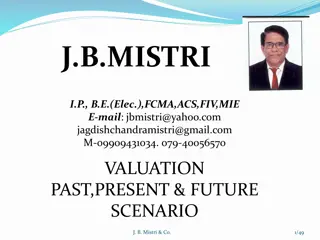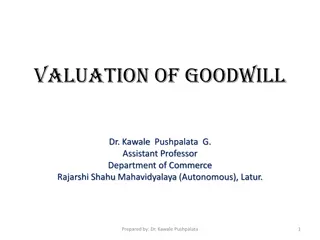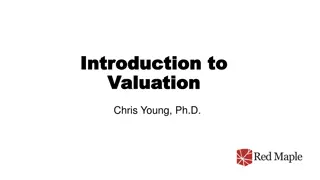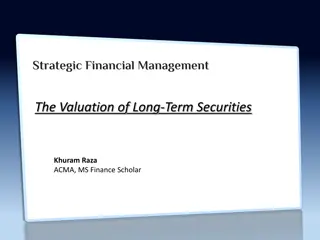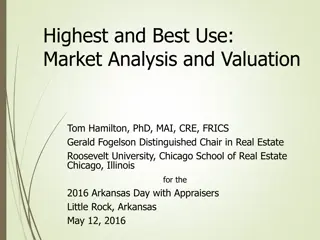Understanding Suits Valuation Act 1887 and Its Purpose
The Suits Valuation Act 1887 serves to determine the jurisdiction of courts by valuing specific suits. Its purpose includes ensuring the proper forum, expediting justice, protecting rights, rectifying jurisdictional issues, and assigning relevant courts to each case. The act distinguishes between valuation for jurisdictional purposes and for court fees, with the former based on subject matter value and the latter on statutory rules. A suit's valuation is a crucial preliminary question, to be resolved before trial, and determines jurisdiction in original and appellate suits.
Download Presentation

Please find below an Image/Link to download the presentation.
The content on the website is provided AS IS for your information and personal use only. It may not be sold, licensed, or shared on other websites without obtaining consent from the author. Download presentation by click this link. If you encounter any issues during the download, it is possible that the publisher has removed the file from their server.
E N D
Presentation Transcript
Synopsis Purpose and object of suits valuation Act 1887 Purpose of valuation Valuation under suits valuation and court fees act(Distinction) Suit Valuation; A preliminary question Forum Value for the purpose of court cases(section 8) Determination of valuation for jurisdictional purpose.(original ,appellate) Different suits under section 8 of suits valuation Act 1887 Rules court conclusion Purpose and object of suits valuation Act 1887 Purpose of valuation Valuation under suits valuation and court fees act(Distinction) Suit Valuation; A preliminary question Forum Value for the purpose of court- -fees and jurisdiction be same in certain cases(section 8) Determination of valuation for jurisdictional purpose.(original ,appellate) Different suits under section 8 of suits valuation Act 1887 Rules for court- -fees conclusion fees and jurisdiction be same in certain for determining fees and determining the and jurisdiction the value value of of certain certain classes classes suits suits for for the the purposes purposes of of jurisdiction. .
Purpose and object of suits valuation Act 1887 The purpose of suits valuation act 1887 is to prescribe the mode of valuing certain suits for the purpose of determining the jurisdiction of courts. Purpose of valuation. The object and purpose of valuation is to determine a) Proper forum(original, appellate) b) Speedy justice c) Protection of right d) Removal of defects of jurisdiction e) Relevant court for each case/suit. Purpose and object of suits valuation Act 1887 Purpose of valuation.
Valuation act The purpose of both the Acts is perfectly distinct. The former depends on the value of the subject matter while the other on a by statutory rules. The former fix the value for the purpose of jurisdiction and the later being a fiscal determine the value of a suit for the purpose of court fees. s Valuation under act. .(distinction) under suits suits valuation valuation and and court court fees fees (distinction) certain value fixed enactment prescribing the rules to
Suit Valuation; A preliminary question A suit is properly valued or not is a preliminary question and is to be disposed of before the case goes to the trial. Forum. This question should be determined by the court which has to try the case. Suit Valuation; A preliminary question. Forum.
Determination jurisdictional a) a) In In original suit it is the claim or subject-matter of the claim, as estimated by the plaintiff that determines the jurisdiction of the court. b) In There is a divergence of opinion on the point whether for the purpose of appeal ,it is the value placed by the plaintiff on the subject matter of suit or the value as found by determines the forum of appeal. Determination of jurisdictional purpose In original of valuation purpose. . valuation for for original suit suit. . In appeal appeal b) the court that
Value jurisdiction 8 8) ) Example lacs, this will determine the pecuniary jurisdiction of the court as to which court will deal the suit. Similarly this twenty lacs will determine as to how much court fees is to be paid over it. The plaintiff cannot give one valuation for the purpose of court- fees and another valuation for jurisdiction where these should be the same. He is not entitled to put purposes of jurisdiction and a lower valuation for the purpose court-fees and where he does this the value for the purpose of court-fees is to be taken despite anything to the contrary in the plaint, as the value for the purpose of jurisdiction. Value for jurisdiction be for the the purpose be same purpose of same in of court certain cases(section court- -fees cases(section fees and and in certain Example: : If the value of the subject matter of the suit is twenty a higher valuation for the
Different 1887 Account at which the relief sought is valued in the plaint for purposes of court fees). Suits value for the purpose of court-fee and jurisdiction is same in such suits). Suits forum) Suits a person is a party to a document, he is bound to have a document set aside .section 8 of suits valuation would come into play and the value for the purpose of court-fees and jurisdiction would be identical. In case the plaintiff cancels the document on the ground that the document in question is obtained on the ground of fraud, coercion or undue influence and is without consideration or necessity, the valuation given by the plaintiff determines court-fee as well as jurisdiction and is final. Different suits 1887 Account suit suits under under section section 8 8 of of suits suits valuation valuation Act Act suit(Value for purposes of jurisdiction of an account suit is the amount Suits for for partnership partnership accounts accounts(on same footing as ordinary account suits. The Suits to to set set aside aside an an award award.(Actual value of the subject matter determines the Suits for for cancellation cancellation of of documents documents: Falls under section 7 iv c of court-fees act. If
Suits Falls under section 7 iv c of court-fee Act. If the plaintiff seeking to set aside the decree, was a party to the original suit in which the decree was passed. In such a case section 8 of suit valuation Act would come into play and the value for the purpose of court fees and jurisdiction would be identical but if a person is not a party to a decree, sues to set it aside ,the suit does not come in section 7 iv c of court-fees act but falls in Article 17(iii) of schedule 2 of court-fees Act. Suits for for cancellation cancellation of of a a decree decree:
Declaratory two types, simple declaration and declaration with consequential relief. In former case it is the real value of the property that would determine the valuation. While in a later case the plaintiff has a right to put on his own valuation on his claim for the purpose of court-fee and the same would jurisdiction. In such a suit the court must accept the value of the relief stated in the plaint for the purposes of court-fees and jurisdiction. Declaratory suits suits: Declaratory suits are of be the value for the purpose of
Suits purpose of jurisdiction and court-fees is same. Suits Act, the value for the purpose of court-fee and jurisdiction are identical in cases of injunction Partition amount or value of the subject matter.The value of the plaintiff s share of the properties would therefore determine the valuation both for the purpose of court-fees and jurisdiction. But where a suit for partition of joint family is one for general partition among all co-sharers the value for the purposes of jurisdiction is the value of the entire property sought to be partitioned. Suits for for ejectment ejectment of of tenants tenants: valuation for the Suits for for injunction injunction: Under section 8 of suit valuation Partition suits suits: The valuation in such a suit is the
Suit determining the value of land have been framed by the provincial government ,the value of suits for possession for purposes of jurisdiction will be determined by such rules. But where no such rules exist, the value of such suits will be determined by the judicial decision in the suit. Suit for for possession possession: where the rules for
Pre-emption section therefore exempted from the operation of section 8 of suits valuation act. The subject matter in dispute in such a suit is the right of pre-emption which the plaintiff asserts in respect of the property in the suit and the suit purposes at the value of such right and not at the value of the property itself. suits: of Such court-fees suit fall under are 7 vi act and has must be valued for jurisdictional
Suits Such suits are the one in which it is not possible to estimate at a money value the subject matter of in dispute. So in such cases the question of valuation for the purposes of jurisdiction is not therefore to be decided under section 8 of the suits valuation Act. The jurisdictional value in such a case will be the document. Suits to to enforce enforce registration registration of of documents documents: value of interest created by such
Money a money decree is claimed is the value for the purpose of jurisdiction. The reduction in amount as a result of adjudication or by a compromise between the parties ,does not alter the original valuation for the purpose of appeal and the valuation would determine the forum of appeal. Money suits suits: The valuation of a suit in which
Contracts The valuation for the purpose of jurisdiction is the same value as fixed for the purpose of court-fees(i.e., according to the amount claimed as damages) by virtue of section 8 of Suits valuation Act,1887 Contracts
Rules suits jurisdiction I. It should be remembered that the value for the purpose of court-fees Act,1870 and its value for necessarily identical and are frequently very different. The value for the purpose of court fees is determined by court-fees is determined by court-fees Act 1870,and for the purposes of jurisdiction by the suit valuation act 1887 and the rules made thereunder. Rules for suits jurisdiction. . for determining for determining the for the value value of of of certain court certain classes court- -fees classes fees the the purposes purposes of and and the purposes of jurisdiction are not
The local government has made rules under section 3 of the Act determining the value of land and of certain interests therein for the purposes mentioned in the court fees Act,1870, section 7 para v, vi, x, clause d. of jurisdiction in the suits
In order to guard mistakes as to value of a suit for purposes of jurisdiction and of court-fees respectively, every plaint ought upon its face to show the value for purposes of jurisdiction and as well as the value for purpose of computing court-fees. The former information is in order that the court may determine whether the plaint ,rule 10,of the code of civil procedure. When a plaint omits to the presenting it should be questioned and his answer consents to amend it then and there. requisite should be returned under Order VII disclose the value of a suit for purposes recorded of jurisdiction the ,the , person on plaint unless he
In certain classes of petitions e.g., under guardian and Wards Act,1890, the law allows no choice as regards the taken. There is therefore, no necessity in such cases to fix any valuation for the purpose of determining jurisdiction. In case of an appeal ,great in convenience is caused to courts of appeal when the original record does not disclose the value of the suit, it is therefore ,that the value of the suit as fixed by the plaintiff or as determined by the court in the event of its being disputed should ,therefore always be stated on the face of the final judgment and the decree in the suit for information of the parties and of the court of appeal. court in which proceedings must be
When the copies filed with the memo of appeal does not disclose the value ,the appellate court must ascertain and determine whether the value of the suit as instituted, does or does not exceed the limits of its appellate jurisdiction. No objection as to valuation can be taken in the appeal unless the same is taken in the trial court before the framing of issues and unless the Appellate court is satisfied that the suit was not properly valued and that the mistake in the valuation had prejudicially affected the disposal of the suit on merits. It is the amount so determined by the trial court which determines the forum of appeal. In accounts suit it is not the tentative valuation of the plaintiff but the amount found to be due and decreed by the court that determines the forum of appeal.
Deputy commissioner Peshawar and Federal board of Revenue in determining the value of land, play an important role in determining the value of land and in this regard a valuation table is issued for determining non-agricultural land. the value of agricultural land and
Conclusion Suits valuation Act helps in determining the forum of suit i,e. for original and appellate This question is to be determined by the trial court before the framing of issuses. The appellate court can entertain when the miscarriage of justice. Conclusion jurisdiction the objection of suit valuation only improper valuation has resulted in the













